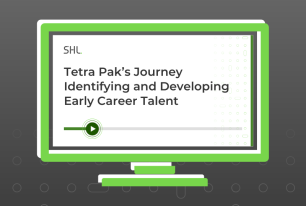“Did They Really Ask That?”: Five Tips for Better Interviews
Better interviews begin with asking relevant questions, standardizing your process, establishing your scoring, empowering your interviewers, and embracing continuous improvement.
Share
If you're a recruiter or hiring manager, then the importance of conducting a good interview account be understated. Information gathered from interviews accounts for more than half of the average selection decision. However, many organizations struggle to align their interview process with the core competencies needed for the role. As a result, less than one-third of interviewers ask candidates relevant, probing questions, so they miss opportunities to bring desired actions and behaviors into the organization.
While there is no shortage of suggestions for how to build a consistent and effective interview process that also provides a great candidate experience, focusing on the following core tenets will lay a solid foundation from which to build:
#1—Ask Relevant Questions
The discrepancy between the job description and the interview accounted for 26% of candidate dropout based on a 2019 study1, so asking relevant questions can determine whether a candidate walks away from your hiring process. Leveraging job descriptions and hiring manager feedback ensures that you’re only considering competencies that are job-related.
Identifying interview questions that tie back to relevant competencies means that you are focusing on gathering relevant information during the interview. Leveraging existing content or writing your own questions from scratch can help to speed up this process. Constructing questions in a way that prompts candidates to talk about things they have done will provide insight into their potential future behavior.
Framing questions with “Tell me about a time when…” instead of using hypothetical “How would you…” will draw out specific examples. Include probing questions to elicit specifics. Probes don’t need to be detailed, but they should be present as this will help to remind interviewers to get a full response for each question (e.g., “What was the situation?” and “What action did you take?”).
Identifying interview questions that tie back to relevant competencies means that you are focusing on gathering relevant information during the interview.
#2—Standardize Your Guides
Now that you’ve identified your competencies and written job-relevant behavioral interview questions, you should standardize the process by limiting interview guide creation to human resources staff initially and being prepared to supply them with limited effort. Appearing well-prepared to the candidate helps to build rapport during the interview as well as leaving candidates with a positive impression overall, so ensure that interview components like introductions, ice breakers, and closings aren’t overlooked when creating guides. It’s well worth it to solicit feedback from hiring managers around guide structure, wording, and design because a confusing guide is less likely to be used consistently.
#3—Establish Scoring Processes
Collecting information during an interview isn’t typically an issue; deciding what to do with it is more likely to cause problems. Building behavioral anchors into your guides for each competency improves accuracy and consistency in scoring. When defining a scoring process, consider scoring candidates on each competency (not each question), conducting timely follow up meetings for consensus, and making evidence-based decisions. Interview score and recommendation information should be formally documented and filed appropriately for later reference.
Interview score and recommendation information should be formally documented and filed appropriately for later reference.
#4—Empower Your Interviewers
Interviewer training is the final piece to ensure that your interviewers will show up confidently and consistently to every interview. Train your interviewers on potentially unfamiliar topics such as understanding job-related competencies, evaluating behaviors based on responses, and legal compliance.
Research has found that positive candidate experience can improve new hires’ discretionary effort by 15% and intent to stay by 38%. Don’t underestimate the utility in training interviewers on soft skills such as body language, active listening, and basic interview preparation. Building strength in these areas will help your interviewers to create a consistent and positive experience for every candidate and can leave candidates with a positive impression of the role and company overall.
#5—Embrace Continuous Improvement
As resources permit, consider conducting follow up analysis to compare interview scores against job performance for candidates hired using your process. Insights gained from comparisons can inform selection, onboarding, and developmental activities within your organization. For feedback around your selection program, solicit feedback from candidates about the interview process itself. Results from internal reviews and candidate feedback can highlight opportunities to improve the interviewer and candidate experience, as simply asking for feedback can lead to a 72% increase in positive candidate experience2.
While these five tenants cover the basics, you may find that your organization needs a more strategic review to update or design an interview program. If this is the case, start by asking the organization what the goals are for the new or improved interview process, and design your work around those desired outcomes.
Whether you’re designing an interview process from scratch or updating an existing program, asking relevant questions, standardizing your process, establishing your scoring, embracing continuous improvement, and empowering your interviewers are core to fostering a consistent interview experience for interviewers and candidates alike.
To learn more about how SHL can support your interview process, explore our interview resources.
Endnotes
1 TalentBoard (2019). 2019 North American Candidate Experience Research Report.
2 TalentBoard (2019). 2019 North American Candidate Experience Research Report.









